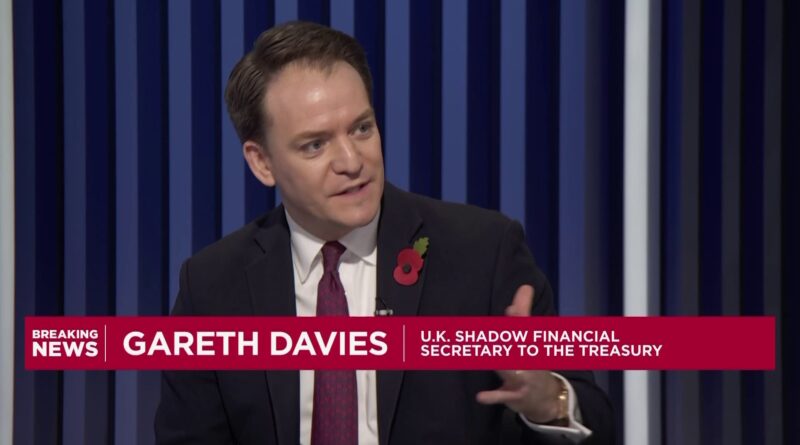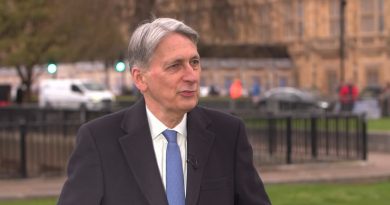UK Exchange: A minimum wage hike — with maximum consequences
This report is from this week’s CNBC’s UK Exchange newsletter. Like what you see? You can subscribe here.
The dispatch
Although her next Budget remains three weeks away, exhausted political commentators are already confident of some measures to be announced by Rachel Reeves, the U.K.’s finance minister.
One is a further extension of the freeze in the thresholds at which people begin to pay the basic and higher rates of income tax.
Another is a 4% rise in the National Living Wage (NLW) — the minimum hourly wage British employers must pay workers aged 21 or over — to £12.70 ($16.56) from the start of the new tax year in April 2026.
This would take the annual salary for someone on the NLW working a 40-hour week to £26,416. (The NLW is not to be confused with the lower National Minimum Wage, paid to those between the ages of 16 and 21, although there is speculation Reeves will bring that into line with the NLW for workers over 18).
It would confirm the U.K. as having one of the world’s highest statutory minimum wages, lower than Australia and New Zealand, but higher than peers like France and Germany and appreciably ahead of Japan, the U.S. and Canada.
This is already hitting the wider economy. The latest NLW increase — to £12.21 in April — was accompanied by a rise in employers’ National Insurance, a payroll tax, along with a fall in the level at which the latter kicks in. That raised employment costs sharply and jobs — especially in hospitality — have accordingly been lost. The number of payrolled employees in the U.K. fell by 115,000 between August 2024 and August this year. The move also contributed to higher inflation.
UK Chancellor of the Exchequer Rachel Reeves at a roundtable meeting during her visit to the British Steel site on April 17, 2025 in Scunthorpe, England.
Wpa Pool | Getty Images News | Getty Images
Yet the wage increases expected this month could have another impact. According to the Financial Times, many employers worry that, after the anticipated rise, those on the NLW will be earning close to the typical starting salary for graduate roles in professions like accountancy, law and finance.
The paper quoted one chief executive as saying: “Why would young people take on £45,000 of student debt if they can earn the same stacking shelves?”
Such dynamics threaten to upend the established premise that a university degree guarantees a better job and higher earnings. This assumption underpinned a massive expansion of university education kick-started by Tony Blair, the former prime minister, who in 1999 said he wanted 50% of school-leavers to attend university — up from around one-third at the time. That target was reached in 2019.
However, going to university has become significantly more expensive, with the cost of higher education shifting from the state to the individual via tuition fees. These were set at £1,000 per year when Blair’s government introduced them in 1998 and have since risen to £9,535 per year in England (they are lower in Wales and Northern Ireland, while Scottish students studying in Scotland pay no tuition fees). Most students take out loans to repay these fees, which now become repayable once the salary of a graduate reaches £25,000. Those repayments are 9% of salary and effectively act as a graduate tax.
So not only does the hike in the National Living Wage threaten to match graduate starting salaries in the professions, a graduate paid the same as someone on the NLW will actually take home less money if they took out a student loan.
Meanwhile, graduate jobs are becoming scarcer. The Institute of Student Employers reported last month that big graduate employers have cut back on hiring for the second consecutive year, reducing their intake by 8% in the latest academic year alone. Three of the U.K.’s “big four” accountancy firms (PwC, EY, KPMG and Deloitte), traditionally among the biggest recruiters of new graduates, have reduced hiring by even more.
So could this push 18-year-olds away from university and toward trades, apprenticeships or even entrepreneurship?
Graduate salary premium?
Keir Starmer, the current Prime Minister, indicated this was his aim when in September, he dumped Blair’s target, arguing it was not “right for our times.” Instead, he wants two-thirds of school leavers to either go on to university, further education or a “gold standard apprenticeship” (one ending in a technical qualification) by the age of 25.
This greater emphasis on training and skills is a big change of tone — although manufacturers, in particular, doubt the training can be delivered following years of course closures at further education colleges. The 2017 launch of the apprenticeship levy — a tax of 0.5% on employers with an annual payroll of more than £3 million — was intended to finance more skills training but instead prompted large employers to focus on existing employees rather than new ones. The number of apprenticeships has fallen by a third since 2015, while engineering apprenticeships are down by 40% since 2017.
Despite the greater premium being placed on skills — one leading engineering employer is currently said to be offering salaries of £90 an hour for skilled welders — there is little evidence that 18-year-olds are foregoing university. The Universities and Colleges Admissions Service (UCAS) reported in February that a record 600,660 of them had applied for a university or college place for the new academic year, up 1% on 2024-25.
And, while the salary premium for graduates has narrowed, it still exists. The Policy Institute at King’s College London and the Resolution Foundation, a centre-left think-tank, reported in January that an undergraduate degree is worth, on average, an extra £280,000 for men and £190,000 for women, net of tax and student loan repayments, relative to their lifetime earnings had they not gone to university.
So perhaps the current concern is overdone. Logic suggests a worker on the NLW is likely to remain on or close to this wage in most cases, while a graduate entering a profession like accounting can expect significant pay increases as their career progresses.
So, while the rise in the National Living Wage may yet reshape Britain’s job market and universities — a number of which are already in financial difficulty as a result of over-expansion — don’t expect any immediate change.
— Ian King
Top TV picks on CNBC

U.K. Shadow Financial Secretary to the Treasury Gareth Davies says it’s “a little bit rich” for Chancellor of the Exchequer Rachel Reeves to criticize his Conservative Party’s time in power.

Carsten Nickel, managing director at Teneo, discusses U.K. Chancellor Rachel Reeves’ surprise speech from Downing Street on Tuesday.

Ryanair CEO Michael O’Leary hits out at the U.K. government, warning against tax increases on the airline sector and saying Chancellor Rachel Reeves “hasn’t a clue how to deliver growth.”
— Holly Ellyatt
Need to know
UK’s Reeves addresses speculation over tax rises in unusual pre-budget speech U.K. Chancellor Rachel Reeves addressed speculation around her fiscal plans and told the British public that her budget will focus on “fairness and opportunity” but that there were “pressures on the public finances” that needed to be faced.
A cyberattack on Jaguar Land Rover raises questions about Britain’s preparedness. On Sept. 2, JLR reported it had experienced a “cyber incident.” The Cyber Monitoring Centre estimated the attack cost the U.K. £1.9 billion ($2.5 billion).
Shell announces share buybacks as earnings top estimates. The British oil giant reported Thursday adjusting earnings of $5.4 billion for the quarter, higher than the $5.05 billion estimated by analysts, according to LSEG. It also unveiled a $3.5 billion share buyback over the next three months.
— Yeo Boon Ping, Holly Ellyatt
Quote of the week
It’s a zero sum game, if governments are stupid enough to tax mobile assets like aircraft and air travel – they move. If they’re stupid enough here in the U.K. to tax wealth — wealth moves.
In the markets
London’s FTSE 100 moved marginally higher over the past week, adding around 0.1% in the seven days to Tuesday’s close. Corporate earnings have been in focus for U.K. investors, with a flurry of London-listed companies, including HSBC, GSK and oil majors Shell and BP all reporting.

The performance of the Financial Times Stock Exchange 100 Index over the past year.
Meanwhile, the yield on the U.K.’s benchmark 10-year government bonds — known as gilts — had a volatile Tuesday after Reeves’ surprise pre-Budget speech.
The chancellor addressed speculation that the governing Labour Party will break its manifesto pledge not to raise taxes for working people — but would not be drawn into giving a definitive answer on whether tax rises were on the cards.
Yields fell by as much as 4 basis points during the speech, but the downward moves narrowed as she failed to deliver any concrete directives on what to expect on Nov. 26.
The gilt market’s reaction reflected “initial relief followed by wariness,” according to Julian Howard, chief multi-asset investment strategist at GAM Investments, who noted a “frustrating lack of detail” in the address.
The British pound shed around 1% against the U.S. dollar over the past week, to trade around $1.3035 late Tuesday.
— Chloe Taylor
Coming up
Nov. 5: New U.K. car sales for October
Nov. 6: Bank of England rate decision
Nov. 11: U.K. unemployment rate for September
— Holly Ellyatt
Source – CNBC




